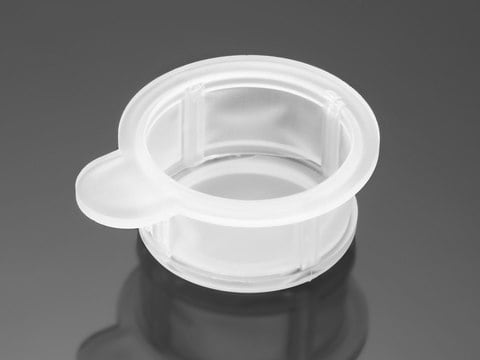D1947
Diffinity RapidTip®
for PCR Purification
Sinónimos:
PCR clean up tip, PCR purification tip, PCR reaction clean-up tip
Iniciar sesiónpara Ver la Fijación de precios por contrato y de la organización
About This Item
Productos recomendados
Nivel de calidad
formulario
solid
fabricante / nombre comercial
(Diffinity Genomics, Inc.)
capacidad
50(µL)
temp. de almacenamiento
room temp
¿Está buscando productos similares? Visita Guía de comparación de productos
Descripción general
Diffinity RapidTip effectively removes dNTPs, primers and primer dimers while providing greater than 90% recovery of pure DNA fragments from 100 bp to 10 kb. The functional pipette tip contains everything you need for PCR purification. The tip is filled with a proprietary adsorption technology that has a differential affinity for PCR components. The dispensed solution yields purified, high quality DNA ready for downstream applications such as DNA sequencing, SNP analysis and microarray printing.
Aplicación
Diffinity RapidTip® has been used in PCR product purification.
Características y beneficios
- Single step
- Recovers 90% of high quality dsDNA
- Optimized for 25 μL RXN
Información legal
RapidTip is a registered trademark of Diffinity Genomics, Inc.
Certificados de análisis (COA)
Busque Certificados de análisis (COA) introduciendo el número de lote del producto. Los números de lote se encuentran en la etiqueta del producto después de las palabras «Lot» o «Batch»
¿Ya tiene este producto?
Encuentre la documentación para los productos que ha comprado recientemente en la Biblioteca de documentos.
Sarah L Dean et al.
Molecular ecology, 23(6), 1364-1378 (2013-10-12)
Nitrogen (N) deposition rates are increasing globally due to anthropogenic activities. Plant community responses to N are often attributed to altered competitive interactions between plants, but may also be a result of microbial responses to N, particularly root-associated fungi (RAF)
Teruaki Nakatsuji et al.
Nature communications, 4, 1431-1431 (2013-02-07)
Commensal microbes on the skin surface influence the behaviour of cells below the epidermis. We hypothesized that bacteria or their products exist below the surface epithelium and thus permit physical interaction between microbes and dermal cells. Here to test this
Michael J Goblirsch et al.
PloS one, 8(7), e69831-e69831 (2013-07-31)
A major hindrance to the study of honey bee pathogens or the effects of pesticides and nutritional deficiencies is the lack of controlled in vitro culture systems comprised of honey bee cells. Such systems are important to determine the impact
H Kühlwein et al.
Journal of applied microbiology, 115(5), 1091-1106 (2013-07-31)
To assess the effects of dietary Saccharomyces cerevisiae β-(1,3)(1,6)-D-glucan supplementation (MacroGard(®)) on mirror carp (Cyprinus carpio L.) intestinal microbiota and ultrastructure of the enterocyte apical brush border. Carp were fed either a control diet or diets supplemented with 0.1, 1
Lisa A Santry et al.
Virus research, 175(1), 30-44 (2013-04-16)
Maedi-visna virus (MVV) and caprine arthritis encephalitis virus (CAEV) are related members of a group of small ruminant lentiviruses (SRLVs) that infect sheep and goats. SRLVs are endemic in many countries, including Canada. However, very little is known about the
Nuestro equipo de científicos tiene experiencia en todas las áreas de investigación: Ciencias de la vida, Ciencia de los materiales, Síntesis química, Cromatografía, Analítica y muchas otras.
Póngase en contacto con el Servicio técnico









